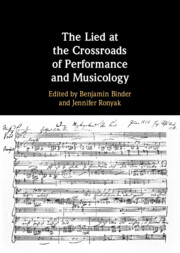Book contents
- The Lied at the Crossroads of Performance and Musicology
- The Lied at the Crossroads of Performance and Musicology
- Copyright page
- Dedication
- Contents
- Figures
- Tables
- Music Examples
- Contributors
- Foreword
- Acknowledgments
- Introduction
- 1 In Search of Song
- 2 Max Heinrich, “Wizard of Song”
- 3 Fragmenting Frauenliebe und -leben
- 4 Robert Schumann’s “Ich grolle nicht”
- 5 Schubert’s Mignon and Reimann’s Mignon
- 6 Locating the Wanderer’s Solitude in Choral and Nonsolo Performances of Winterreise
- 7 Analysis, Performance, and the Deep Nineteenth Century
- 8 Crossing Boundaries
- 9 Singers Speak about Musicology and Performance
- Bibliography
- Index
4 - Robert Schumann’s “Ich grolle nicht”
Unsettling the Song Cycle
Published online by Cambridge University Press: 09 February 2024
- The Lied at the Crossroads of Performance and Musicology
- The Lied at the Crossroads of Performance and Musicology
- Copyright page
- Dedication
- Contents
- Figures
- Tables
- Music Examples
- Contributors
- Foreword
- Acknowledgments
- Introduction
- 1 In Search of Song
- 2 Max Heinrich, “Wizard of Song”
- 3 Fragmenting Frauenliebe und -leben
- 4 Robert Schumann’s “Ich grolle nicht”
- 5 Schubert’s Mignon and Reimann’s Mignon
- 6 Locating the Wanderer’s Solitude in Choral and Nonsolo Performances of Winterreise
- 7 Analysis, Performance, and the Deep Nineteenth Century
- 8 Crossing Boundaries
- 9 Singers Speak about Musicology and Performance
- Bibliography
- Index
Summary
The tonal relationships between the songs of Robert Schumann’s Dichterliebe Op. 48 (1840) have been studied extensively by musicologists. Indeed, it is typically key, more than poetry, narrative, or style, upon which arguments for the coherence of the song cycle hang. Such careful analytical accounts, however, are rarely heeded by performers, who often transpose songs. Schumann did not specify a voice type for Dichterliebe; the dedication of the first edition to Wilhelmine Schröder-Devrient seems more to do with her character than her Fach. A tenor may sing the whole cycle at pitch, but baritones, basses, sopranos, and mezzos rarely do so, with one exception: the seventh song, “Ich grolle nicht,” which almost everybody performs in the original key of C major. The primary reason for so doing appears to be that age-old weakness of singers to show that they can manage the high note: here, an ossia top A. Exploring the historical and poetic contexts of “Ich grolle nicht” illustrates the tensions between the hermeneutics of reading and analyzing a score and interpreting that same score in performance. David J. Levin wrote about how performances can “unsettle” even canonical operas; the same is true of song cycles, but perhaps musicology can also unsettle approaches to performance.
Keywords
- Type
- Chapter
- Information
- The Lied at the Crossroads of Performance and Musicology , pp. 78 - 101Publisher: Cambridge University PressPrint publication year: 2024



